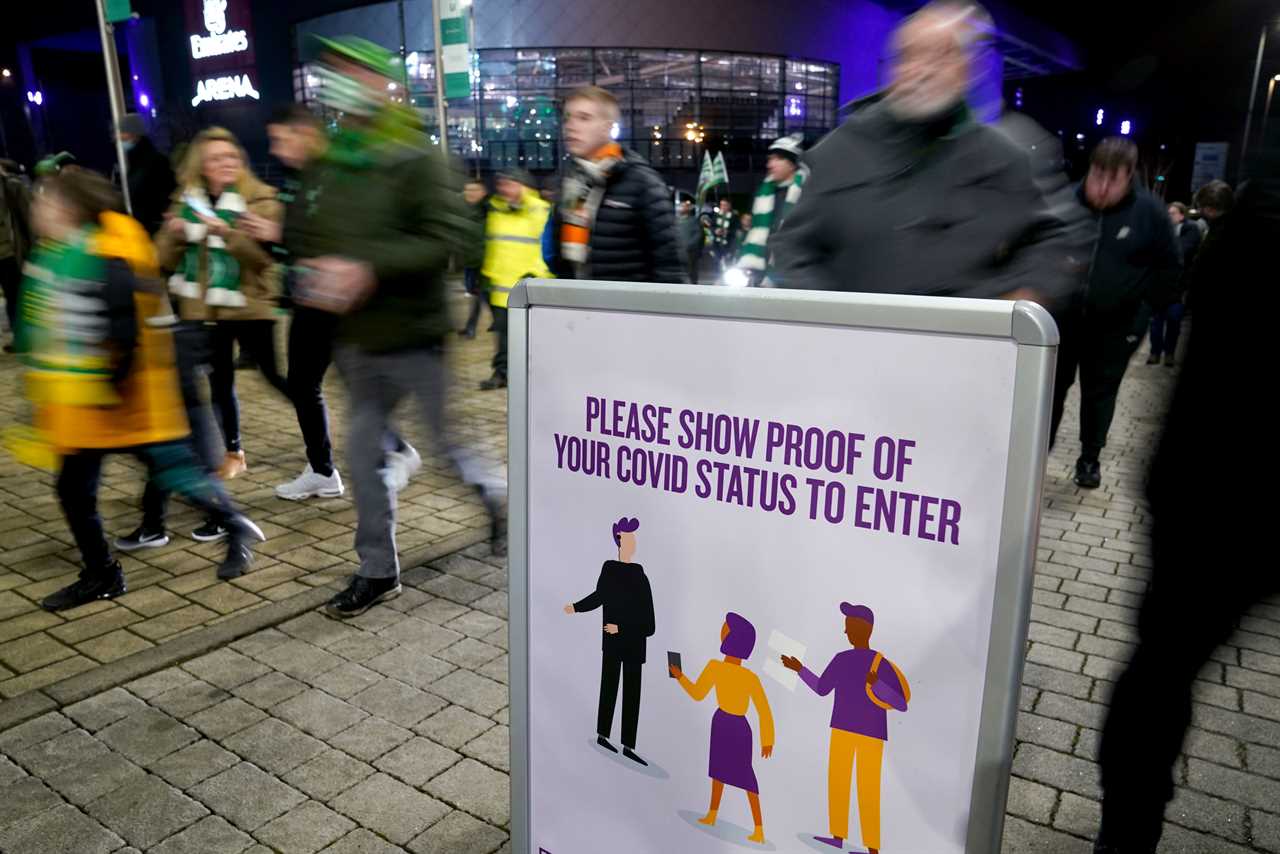BRITS can be “cautiously confident” that we’re approaching the end of the Covid pandemic, Dominic Raab said today.
The deputy PM talked about a “positive prognosis” in the fight against the virus in a major boost to hopes all restrictions will soon be dropped.


His remarks came with Boris Johnson readying to bin working from home and vaccine passports from next Wednesday.
No 10 will hold a review of the ongoing need for Plan B measures as soon as the end of this week, with only masks set to stay.
That means Brits will be able to go back to the office and attend mass events like the footie without showing their vaccination status or a negative test.
Asked if the end of the pandemic is “in sight” Mr Raab replied: “I think it’s a bit early to say that definitively, but good we’re asking that question.
“The reality is we are the most boosted country in terms of vaccines of any large country, the most tested in Europe which helps limit the spread.
“We’ve got the most antiviral drugs in Europe, which helps limit the seriousness of cases and severity.”
He added: “These are all because of the judgement calls the Prime Minister made and as a result of that, we’ve been able to open up.
“We’ve got increasing jobs, wages rising, fast economic growth. The Labour Party would have had us still in lockdown if we’d have listened to them.
“So I do think that the prognosis feels cautiously confident, positive. But we still need to wait. We’ve got this review on January 26.
“I think we will be in a better position at that juncture to make any further, clearer prognosis about the end of the pandemic.”

Follow our Covid live blog for all the latest updates
Mr Raab’s comments will further boost hopes Britain is close to learning to live with Covid and moving beyond the pandemic stage.
They come after education secretary Nadhim Zahawi said yesterday that “the numbers are looking positive” in the UK’s fight against Covid.
He added: “I’m confident that when we review this on January 26 then we’ll be in a much better place to lift some of these restrictions.
“I think we are witnessing the transition of this virus from pandemic to endemic.
“I hope we’ll be one of the first major economies to demonstrate to the world how you transition this from pandemic to endemic.”
Even Nicola Sturgeon said she’s “cautiously optimistic we’re turning the corner” as she prepares to ease Scotland’s harsh restrictions today.
Scientists are also increasingly optimistic that the worst of the virus may now be behind us.
Infections and hospital cases are both now falling across the country for the first time since Omicron swept the country.
The World Health Organization’s Covid special envoy David Nabarro said Britain could now see “light at the end of the tunnel”.
And Professor Paul Hunter, from the University of East Anglia, predicted that life could be back to normal by the summer.
He said: “Covid will soon be just one of the causes of the common cold and will be a pain in the behind, maybe flaring up in winter.
“We will need boosters for the most vulnerable but I can’t see widespread mask use or testing being warranted.
“I think it’s quite plausible that we won’t have any restrictions by summer. That is a reasonably realistic expectation.
“Ultimately, we will live in a society that this thing circulates quite widely and every few years we’ll get a dose of the cold.
“But ultimately, it won’t be killing people, with the exception of our older population.”
Professor Andrew Hayward, who sits on the Sage committee that advises the Government, was also upbeat.
He agreed that “pandemic will end and we will move to a situation where we’re living with the virus continuing to transmit but causing much less disruption”.
Cases and hospitalisations down
He added: “It will tend to settle into a seasonal pattern. We may still get quite big winters of infection but not the sort of level where we can justify wholesale societal closedown.
“So I think it is genuinely an optimistic picture, but we’re still not quite there yet.”
Professor David Heymann recently suggested Britain may be the first country in the world to emerge from the pandemic.
Weekly infections are down 42 per cent compared with the previous seven days — with a fall of more than 500,000.
And 16,621 Covid patients are now in NHS beds in England, down from 17,120 a week earlier.
Professor Alastair Grant, from the University of East Anglia, said cases were plummeting nationally, with England’s R rate at 0.67.
It means for every 100 infections, just 67 are passed on.
Did you miss our previous article...
https://trendinginthenews.com/uk-politics/culture-sec-nadine-dorries-orders-bbc-to-get-out-of-its-elitist-london-bubble-as-she-confirms-licence-fee-freeze






